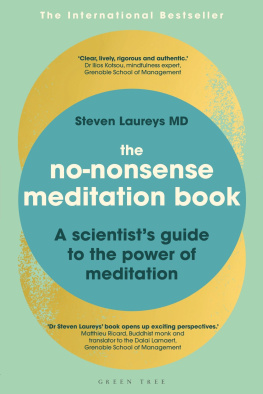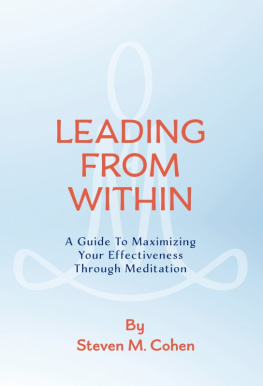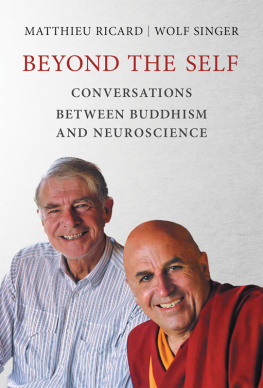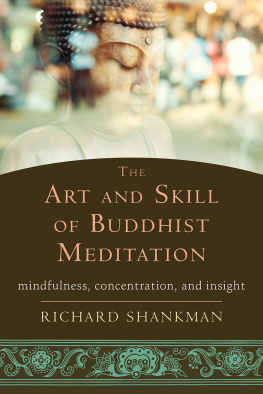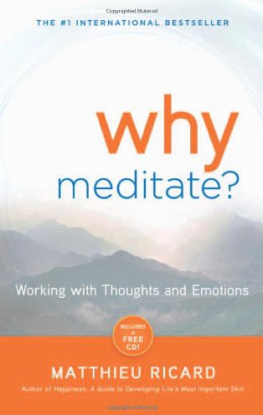
Praise for The No-Nonsense Meditation Book
Clear, lively, rigorous and authentic... The book we have been waiting for.
Ilios Kotsou, PhD, Chair in Mindfulness, Grenoble School of Management
Steven Laureys book opens up exciting perspectives.
Matthieu Ricard, PhD, Buddhist monk & translator of the Dalai Lama
Not reading this is self-defeating.
Paul Witteman, Dutch journalist and TV presenter
Dr Laureys provides an unusually cogent and compelling description of different forms of meditation and why we should care about them. The book is both a tutorial and a guide, and helps the reader understand large bodies of scientific work and their implications for everyday life. This book gives new meaning to the idea of mental exercise, and I recommend it to all who seek to have more focused and directed behaviour and a deeper understanding of their place in the world.
Stephen M. Kosslyn, PhD, President Emeritus, Harvard University Foundry College
I have known for some time that I should be meditating, but have always found some reason not to. This brilliant book has banished all those reasons. Laureys really does cut out all the nonsense and provides the clearest-yet description of meditation and its benefits. He will change (and save) lives.
Trevor Harley, FBPsS, Emeritus Professor of Psychology, University of Dundee, Scotland
By weaving the neuroscience of consciousness with the contemplative roots of compassion with easy-to-follow meditation instructions, into a personal story, this book pulls you in and might just change your life. The clarity and simplicity of Dr Laureys voice makes it feel like he is in the room with you and his humor and scepticism, about nearly everything, makes this book an easy and delightful read.
Nancy E. Oriol, MD, Harvard Medical School, Boston
In Steven Laureys beautiful and timely book, both hard-core scientists and contemplative practitioners will find inspiration and guidance The No-Nonsense Meditation Book is a wonderful amalgamation of scientific rigor with touching, compassionate, and humble curiosity.
Diego Hangartner, Co-Founder of Mind and Life Europe
This book, describing one Belgian neurologists journey from sceptic to advocate, provides an excellent overview of our current neuroscientific understanding of meditation, and its potential role in health and disease.
Jerome Engel, MD, PhD, Professor of Neurology, UCLA, Los Angeles
To all my patients, colleagues, health workers, students, contemplative monks, who taught me to appreciate the power of meditation.
To my admirable children, Clara, Hugo, Matias, Louis, Margot, who have all have been a source of inspiration, ethics and mindfulness in action.
To my wife Vanessa, the sunshine of my life.

Contents
~
Allow me to start off by thanking everyone who taught me how to better experience the power of meditation, to use it in my personal and professional life, and now also to prescribe it in my role of health care provider and neurologist. Im forever grateful to Matthieu Ricard, my very dear friend, my source of inspiration, my model of embodied ethics, optimism and courage, but also my scientific colleague and incredible guinea pig. I also wish to thank all my friends, colleagues and those practising a contemplative life whom I met at Mind & Life Europe: Amy Cohen Varela (spouse of the late Francisco Varela); Lama Tsoknyi Rinpoche, Diego Hangartner, Martine Batchelor (Tibetan monks); Antoine Lutz, Wolf and Tania Singer, as well as Elena Antonov (neuroscientists); Michel Bitbol and Thomas Metzinger (philosophers); Andreas Roepstorff (anthropologist); Ute Brandes, Charles-Antoine Janssen and Cornelius Pietzner.
Thank you to all other research colleagues and pioneers in meditation for having opened my eyes to a new world. Thank you also to all the people of the superb Yeunten Ling Tibetan Institute in Huy, to Lama Zeupa and to Lea Van Rompay, where I was lucky enough to have been able to do a private retreat upon an invitation extended by Peter Brems (VRT Belgian Public Television).
Thank you to Ilios Kotsou and his wife, Caroline Lesire, for having invited me to their very inspiring conference series, mergences, in both Brussels and Montreal, which gave me the opportunity to meet fantastic people, most of whom are expert meditators, including Alexandre Jollien and Frdric Lenoir (philosophers), Christophe Andr, Edel Maex and Christophe Faur (psychiatrists), Candice Marro and Ozan Aksoyek (psychotherapists), Nicole Bordeleau, Jean-Marie Lapointe, Rmi Tremblay (authors and conference speakers), Jean-Luc Daub (animal welfare activist), and Maria Joo Pires and Julien Brocal (pianists).
Thank you as well to all those who contributed interviews for this book, avid meditators Sam Harris (neuroscientist, philosopher and author), David Lynch (mind-bending filmmaker), Tim Parks (novelist) and Jules Evans (philosopher-author), the decathlete and European champion Thomas Van der Plaetsen, yoga expert Joachim Meire, psychiatrist and mindfulness pioneer and CEO Edel Maex. I am also immensely grateful to all my research colleagues whom I have quoted, and who shared their knowledge and contribution to a better understanding of the effects of meditation on our brain and health.
I would also like to thank, of course, all the participants in our research studies and all the neuroscientists at our GIGA Consciousness Lab at the University of Lige, as well as all the health-workers at the University Hospital at Lige and at our brain centre, the Centre du Cerveau, and the wonderful colleagues from the CERVO Brain Research Centre of Laval University in Canada. Our work on human consciousness still represents an enormous challenge and means we often have to go against the grain, but having such dream-teams to collaborate with makes this work so much more rewarding.
As for our research on meditation, which started with Matthieu Ricard in 2015, it currently continues with other experts, but also with inexperienced meditators, whether it covers the fields of mindfulness, of hypnosis (Dr Audrey Vanhaudenhuyse), of cognitive trance (Dr Olivia Gosseries), or other altered states of consciousness. Our research also continues thanks to our collaborations with colleagues such as Bindu Kutty, professor in neurophysiology at the National Institute of Mental Health and Neurosciences (NIMHANS) in Bangalore, India; with engineer Rajanikant Panda, who is currently finishing his doctoral thesis in our team; with anaesthetist Subramaniam Balachundhar at Harvard University, who works on the effects of yoga on the brain; with my friend the psychologist Ron Kupers, at the University of Copenhagen, and his spouse Dr Laurence Dricot from the Catholic University of Leuven, who studies the effects of heartfulness meditation, comparing it with physical exercise; and last but not least with Matthieu himself and the scientists of Mind & Life Europe, in particular Antoine Lutz, a mindfulness pioneer at the University of Lyon.
Many thanks to all our brilliant undergraduates, PhD students and post-doctoral researchers, all of whom have been a source of inspiration with their humanism, sense of fun and rebellious minds, and the large array of complementary disciplines and diversity of countries and cultures they represent. I am listing them in a more or less chronological order: Dr Caroline Schnakers, neuropsychologist, my first PhD student, who now works in Los Angeles with her husband and colleague, Professor Martin Monti (I am pleased to report that they met each other in the console room of our fMRI); Professor Mlanie Boly, neurologist and Buddhist, my first medical doctor PhD, who also flew off to the US to take up a post at the University of Madison, Wisconsin; among the neuropsychologists, Dr Audrey Vanhaudenhuyse, who leads our research on hypnosis; Dr Olivia Gosseries, who leads our research on cognitive trance; Dr Camille Chatelle; Dr Athena Demertzi in Greece; Charlotte Martial; Lizette Heine (from Maastricht and now in Lyon); Charlne Aubinet, Manon Carrire, Helena Cassol; Alice Barra and Benedetta Cecconi (Italy); Estelle Bonin (France); neuroradiologists Dr Jean Flory Tshibanda, Carol Di Perri (Italy) and Carlo Cavaliere (Italy); physiotherapists Dr Aurore Thibaut (who leads our research on the electrical stimulation of the brain) and Graldine Martens; the speech therapist velyne Melotte; the revalidation medics Nicolas Lejeune (UCL) and Marie-Michle Briand (Canada); Dr Willemijn Van Erp (Netherlands); Dr Leandro Sanz (Switzerland); biologist Jitka Annen (Netherlands) and Steven Jillings; the computer scientists Stephen Larroque (France) and Federico Raimondo (Argentina); the engineer Rajanikant Panda (our very own meditation expert from India); Sepehr Mortaheb (Iran); Andrea Piarulli and Francesco Riganello (Italy); and finally Ccile Carette, probably the best executive assistant in the known galaxy.

